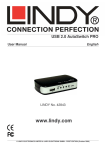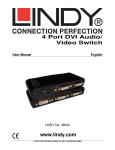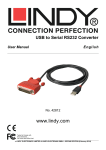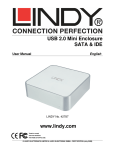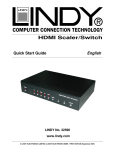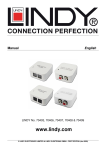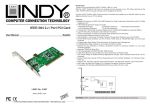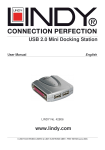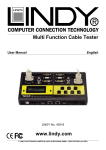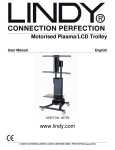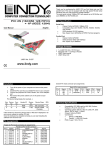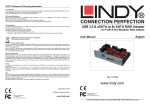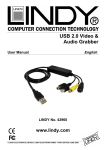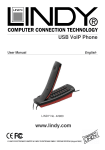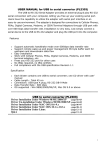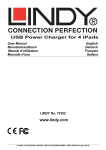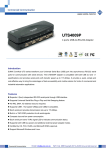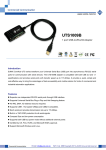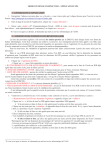Download USB to Serial RS-232 Converter User Manual English
Transcript
USB to Serial RS-232 Converter English User Manual LINDY No. 42811 www.lindy.com © LINDY ELECTRONICS LIMITED & LINDY-ELEKTRONIK GMBH - FIRST EDITION (August 2008) User Manual English Introduction Thank you for purchasing the LINDY USB TO Serial RS-232 Converter! This converter provides a quick and easy way to connect Serial devices to your computers USB port. The USB to Serial Converter is able to make the USB interface totally transparent to serial port peripherals from maximum compatibility. Package Contents LINDY USB to Serial Converter Driver CD This manual Features Connects any standard Serial device to your computer’s USB port Plug & Play USB 1.1 compliant RS-232 compliant, up to 128kbps Supports Remote Wake-up and Power Management USB Bus powered with no external power supply required No IRQ, I/O address or DMA memory address requirements Compatible with Windows ME/2000/XP/Vista, MAC OS 8.6 and above 2 User Manual English Installation Windows ME/2000 1. Insert the supplied Driver CD into your CD-ROM drive and plug in the USB to Serial Converter into an available USB port. Windows will then run the Found New Hardware Wizard to guide you through setting up the new device. Click Next to continue. 2. Select Search for a suitable driver for my device (recommend) and click Next to continue 3. Tick the CD-ROM drives box and click Next to continue. 4. Windows will then search for the approriate driver, once it has located it click Next to begin the installation. 5. Once the installation has ended click Finish to complete the installation. 6. To check the installation was successful go to Control Panel >> System and select the Hardware tab. Now click Device Manager and you will see a screen similar to the one below; you can see the USB to Serial Converter highlighted in the Ports (COM & LPT) category as USB-to-serial Comm Port 3 User Manual English Windows XP/Vista 1. Insert the supplied Driver CD into your CD-ROM drive and plug in the USB to Serial Converter into an available USB port. Windows will then run the Found New Hardware Wizard to guide you through setting up the new device. 2. Select Install the software automatically (Recommended) and click Next to continue. 3. Windows will locate and install the driver on to your computer. 4. Once the installation has ended click Finish to complete the installation. 5. To check the installation was successful go to Control Panel >> System and select the Hardware tab. Now click Device Manager and you will see a screen similar to the one below; you can see the USB to Serial Converter highlighted in the Ports (COM & LPT) category as USB-to-serial Comm Port 4 User Manual English MAC OSX 1. Insert the supplied Driver CD into your CD-ROM drive and copy the following file to your desktop: [CD-ROM Drive]:\USB Serial Adapter\I-Mac\MAC 10.1.x~10.3\md_pl2303hx_1.08b4\PL2303_1.0.8b 4.pkg 2. Run PL2303_1.0.8b4.pkg from the desktop and then click Continue. 3. Select the location in which you want to install the driver and then click Continue. 4. The installation screen will open, click Install to begin the installation. 5. A message advising that the installation will require a restart of your Mac will be displayed, click Continue Installation. 6. When the installation has completed click Restart . 7. When your Mac has restarted you can see the USB to Serial Converter in the System Profile as a USB to Serial Controller, as shown below: 5 User Manual English 6 Radio Frequency Energy, Certifications CE Certification This equipment complies with the requirements relating to electromagnetic compatibility, EN 55024 and EN55022 class A for ITE, EN61000-3-2/-3 the essential protection requirement of Council Directive 89/336/EEC on the approximation of the laws of the Member States relating to electromagnetic compatibility. Shielded cables must be used with this equipment to maintain compliance with radio frequency energy emission regulations and ensure a suitably high level of immunity to electromagnetic disturbances. FCC Warning This equipment has been tested and found to comply with the limits for a Class B digital device, pursuant to part 15 of the FCC Rules. These limits are designed to provide reasonable protection against harmful interference in a residential installation. This equipment generates, uses, and can radiate radio frequency energy and, if not installed and used in accordance with the instructions, may cause harmful interference to radio communications. However, there is no guarantee that interference will not occur in a particular installation. If this equipment does cause harmful interference to radio or television reception, which can be determined by turning the equipment off and on, the user is encouraged to try to correct the interference by one or more of the following measures: Reorient or relocate the receiving antenna Increase the separation between the equipment and receiver Connect the equipment into an outlet on a circuit different from that to which the receiver is connected Consult the dealer or an experienced technician for help You are cautioned that changes or modification not expressly approved by the party responsible for compliance could void your authority to operate the equipment. This device complies with part 15 of the FCC Rules. Operation is subject to the following two conditions: 1. This device may not cause harmful interference, and 2. This device must accept any interference received, including interference that may cause undesired operation. Recycling Information WEEE (Waste of Electrical and Electronic Equipment), Recycling of Electronic Products United Kingdom In 2006 the European Union introduced regulations (WEEE) for the collection and recycling of all waste electrical and electronic equipment. It is no longer allowable to simply throw away electrical and electronic equipment. Instead, these products must enter the recycling process. Each individual EU member state has implemented the WEEE regulations into national law in slightly different ways. Please follow your national law when you want to dispose of any electrical or electronic products. More details can be obtained from your national WEEE recycling agency. Germany / Deutschland Die Europäische Union hat mit der WEEE Direktive umfassende Regelungen für die Verschrottung und das Recycling von Elektro- und Elektronikprodukten geschaffen. Diese wurden von der Bundesregierung im Elektro- und Elektronikgerätegesetz – ElektroG in deutsches Recht umgesetzt. Dieses Gesetz verbietet vom 24.März 2006 an das Entsorgen von entsprechenden, auch alten, Elektro- und Elektronikgeräten über die Hausmülltonne! Diese Geräte müssen den lokalen Sammelsystemen bzw. örtlichen Sammelstellen zugeführt werden! Dort werden sie kostenlos entgegen genommen. Die Kosten für den weiteren Recyclingprozess übernimmt die Gesamtheit der Gerätehersteller. France En 2006, l' union Européenne a introduit la nouvelle réglementation (DEEE) pour le recyclage de tout équipement électrique et électronique. Chaque Etat membre de l’ Union Européenne a mis en application la nouvelle réglementation DEEE de manières légèrement différentes. Veuillez suivre le décret d’application correspondant à l’élimination des déchets électriques ou électroniques de votre pays. Italy Nel 2006 l’unione europea ha introdotto regolamentazioni (WEEE) per la raccolta e il riciclo di apparecchi elettrici ed elettronici. Non è più consentito semplicemente gettare queste apparecchiature, devono essere riciclate. Ogni stato membro dell’ EU ha tramutato le direttive WEEE in leggi statali in varie misure. Fare riferimento alle leggi del proprio Stato quando si dispone di un apparecchio elettrico o elettronico. Per ulteriori dettagli fare riferimento alla direttiva WEEE sul riciclaggio del proprio Stato. LINDY No 42811 1st Edition, August 2008 www.lindy.com








